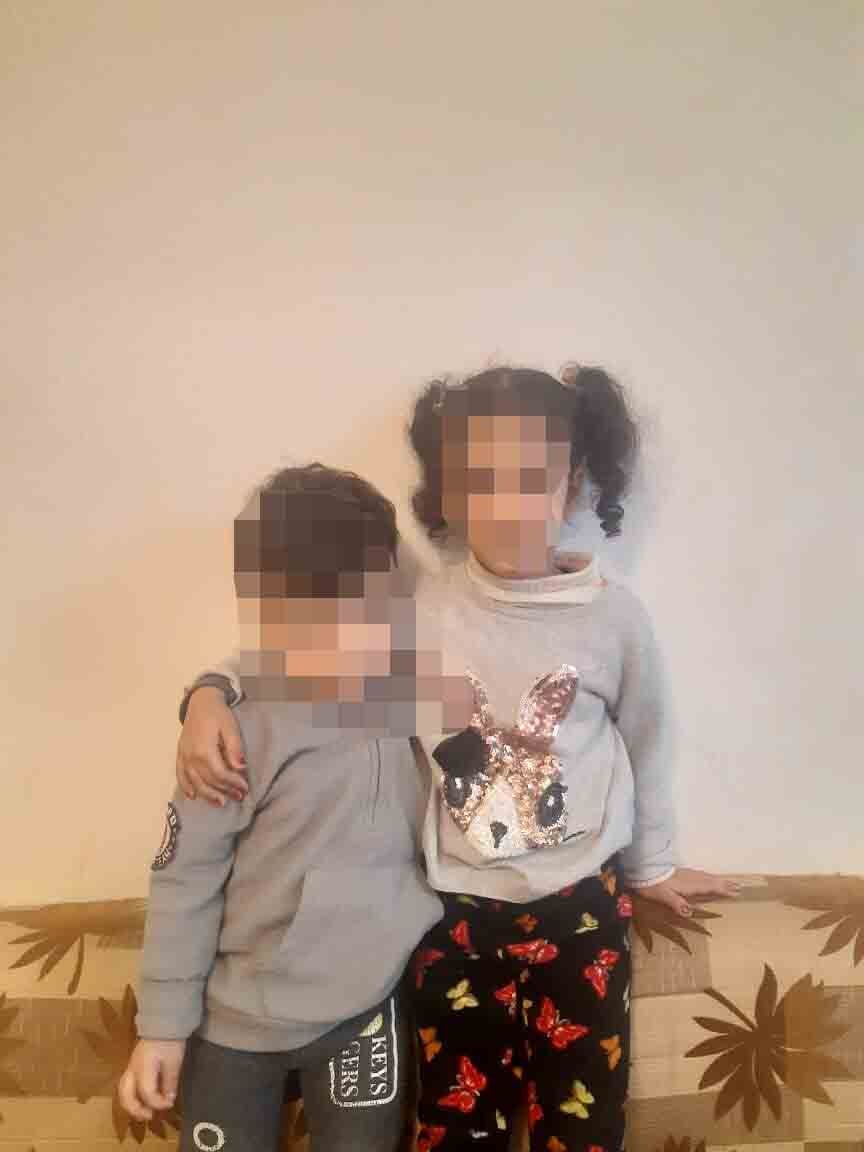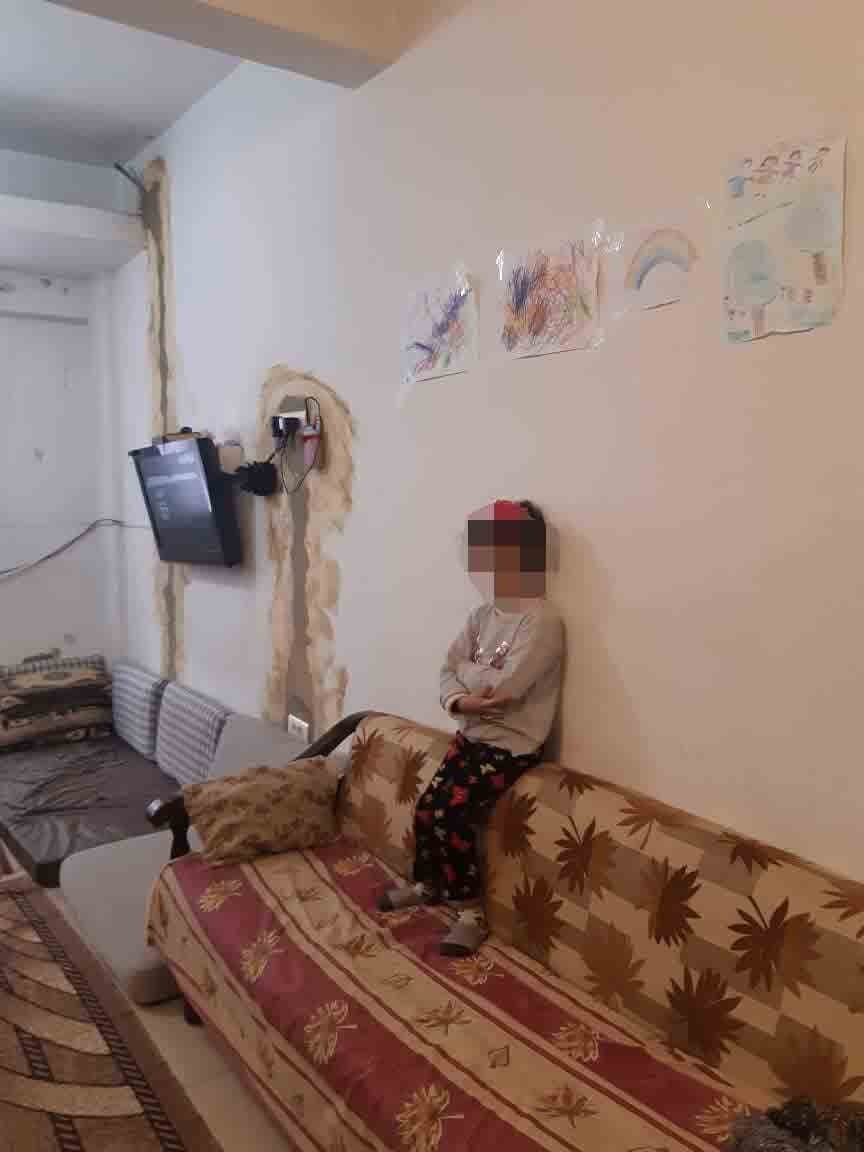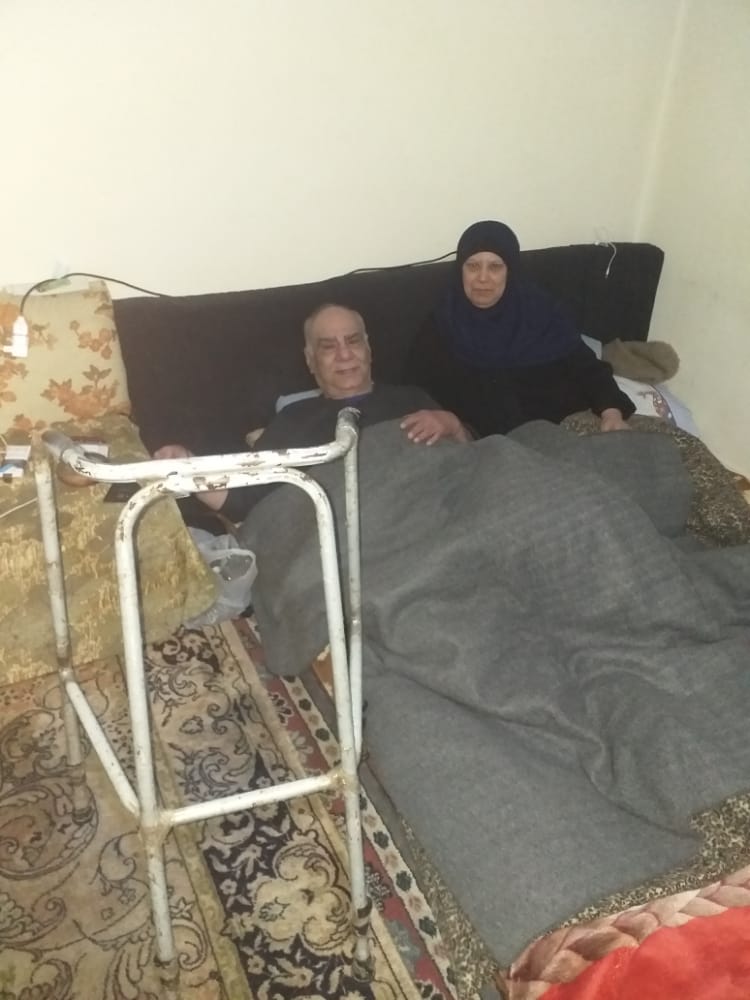‘We’re losing hope’: The refugees waiting for the homes they were promised in Britain
Families who fled their countries were told they would be given a new life in Britain only for resettlement to stop for the pandemic. A year on, they still have no news of their future. Instead, reports May Bulman, they’re forced to struggle on in limbo


Your support helps us to tell the story
From reproductive rights to climate change to Big Tech, The Independent is on the ground when the story is developing. Whether it's investigating the financials of Elon Musk's pro-Trump PAC or producing our latest documentary, 'The A Word', which shines a light on the American women fighting for reproductive rights, we know how important it is to parse out the facts from the messaging.
At such a critical moment in US history, we need reporters on the ground. Your donation allows us to keep sending journalists to speak to both sides of the story.
The Independent is trusted by Americans across the entire political spectrum. And unlike many other quality news outlets, we choose not to lock Americans out of our reporting and analysis with paywalls. We believe quality journalism should be available to everyone, paid for by those who can afford it.
Your support makes all the difference.Muhannad waits with his wife and their two children for the life they have been promised – one not scarred by war and riven by crisis in which his son and daughter can go to school and grow up in safety.
For this family, who fled Syria in 2014, it’s a life that should be theirs by now. They were given a date for their flight from their home in Lebanon and told they would be living in Edinburgh. Muhannad left his job and told the authorities they were leaving. They sold all their furniture and eagerly waited departure.
But days before they had been due to leave last March, the Home Office paused its refugee resettlement scheme. In the 10 months since, the family has not been given any indication as to when they will be transferred to Britain.
In that time, Beirut has been torn apart – by an explosion, an economic crisis and coronavirus. The family are afraid to leave home because they are now undocumented. The children cannot start school and money is hard to come by.
So for now, in a bare, one-bedroom flat with cracks running up the walls, Muhannad, his wife and two children can do nothing but wait as they fall deeper into poverty by the day.
He says: “We had some money saved from when I sold our furniture but it’s running out. I haven’t been able to pay the rent for two months.”
Had things gone to plan, Muhannad’s daughter, Heba, would have entered the Scottish school system in September. His son, Omar, would be in nursery. Instead, the children spend their days waiting listlessly, trapped within the decaying walls.

He says: “My children haven’t been outside in six months. They should be in school. We are illegal here. I cannot work and I avoid going out except to buy the little food we can afford.”
The 36-year-old, an electrician, had been working prior to March last year, had researched Edinburgh extensively.
He says: “It was a dream to leave this swamp in Lebanon. I have read about Edinburgh: the ancient monuments, the festivals and Edinburgh Castle. I was counting down the days, the hours.

“But now we have no idea when we will get out. Life is getting harder each day but the worst part is the uncertainty. We are just waiting for the phone call to say we can finally move to Britain.”
His family is among thousands who were told prior to the pandemic that they had been accepted for resettlement in Britain and that they would be travelling soon – sometimes within days or weeks – but whose transfer has been put on hold.
As part of The Independent’s Supporter Programme, we spoke to refugees who say their lives have been left in limbo for almost a year due to the delay in restarting resettlement programmes. Authorities across Britain are feeling the strain too because of the uncertainty, which they warn could affect services available for years to come.
The pause on resettlement as Britain went into lockdown in March meant that the government missed its target to take 20,000 Syrian refugees by May under the Vulnerable Persons’ Resettlement Scheme, VPRS, which had been introduced by David Cameron in 2015 as the Syrian civil war raged.
Other countries such as the US, France and Spain, also halted their programmes but managed to restart in the summer as restrictions eased. The UK did not.
Following a barrage of criticism, the Home Office announced in November that it would “shortly be restarting resettlement” and that the remaining 232 places under the scheme would be filled “early in the new year”.
A number of Syrian refugee families whose flights were cancelled have since been brought to the UK. On 8 February, immigration minister Chris Philp told the House of Commons that the Home Office would be “completing the 20,000 people under the VPRS in the coming weeks”.
But the number of refugees who were promised resettlement is far higher than 232. The Independent understands that about 600 Syrian refugees due to be resettled in Britain had their travel cancelled due to the pandemic. It is unclear whether the Home Office still plans to resettle those who remain.
Many more face the same situation – more than 3,470 refugees have been accepted under a new resettlement programme, known as the UK Resettlement Scheme, UKRS, which involves other nationalities as well as Syrians.
The government had planned to start the scheme in spring last year and intended to resettle 5,000 people by now.
However, none of the 3,477 accepted under the scheme has received any update from the government as to when – or whether – they will be coming.
Ministers have provided no clarity on when this scheme will start or whether it will start at all. The Home Office announced last week that it plans to carry out a review of safe and legal routes to the UK, including the future approach to resettlement – raising concerns among councils and NGOs that the new programme won’t start until the review is completed, which is likely to take months.
The department told The Independent it would be rolling out a new global resettlement scheme “in future”, but gave no indication as to when. In the meantime, like Muhannad, these thousands of families can do nothing but wait.
There was a house in Newcastle upon Tyne waiting for Tariq and his family. It was fully furnished, freshly carpeted and ready for their arrival. His parents would live nearby in sheltered housing. Tariq’s eight-year-old daughter, who has Down’s syndrome, would be able to have urgent surgery on her heart.
But after their flight was cancelled, Tariq barely sleeps. He lies awake in the cramped, one-bedroom apartment his family of seven now has to call home. His wife, young children and elderly parents sleep uncomfortably on the carpet around him.
They too had sold their furniture and agreed to move out of their old flat in Al Beqaa, 34 miles east of Beirut. The landlord still required them to vacate the property as planned and they moved to the capital in the hope that their flight would be rescheduled soon. The tiny apartment they are now in is all they could afford and they don’t have the money to pay for his daughter’s heart procedure in Lebanon.
In December, nine months after their flight had been scheduled, they had still heard nothing. Tariq’s solicitor here wrote to the Home Office requesting that it expedite the family’s resettlement on the basis of their vulnerabilities. The Home Office responded on 31 December stating that the place was no longer available and that the department was “not currently making arrangements” for the family’s resettlement.
The Home Office said the family was still eligible for resettlement but that ministers were “not yet clear” on the position beyond VPRS.
Tariq, who was held prisoner in Syria before the family fled in 2011, says: “It is not a good situation. If we didn’t plan to leave the country, if we didn’t have the promise we were going, we might be in a better position.

“But they actually told us we were going to leave. We sold everything, everything we had. We were ready to go. It’s put us in a horrible situation. We are in between two things, not really in either. We’re losing hope.”
The 33-year-old, a decorator, has struggled to find constant work in Lebanon, particularly since the pandemic struck. He describes the family’s current living conditions as a “nightmare”.
“We have an elderly man who is unwell and cannot walk properly and a daughter who is very sick,” he says. “And we’re on top of each other in one room. We aren’t mentally well. We don’t have a life, we don’t have rights. We just need to get out.”
In Newcastle, authorities are also frustrated. The council was “ready to accommodate” the family, according to Karen Kilgour, in charge of health and social care, but was told by the Home Office not to hold the property once March’s flight had been cancelled.
Now, she says, it needs a clear path forward for helping refugees. “We are in the middle of the worst public health emergency for a century. We understand getting on top of that remains the government’s top priority. However, we would urge them to provide clarity on the future of the resettlement scheme so we can continue to provide sanctuary to those in dire need.”
The resettlement process is almost entirely reliant on local authorities for accommodation and support for refugees. About 300 councils have housed refugees since 2015 but the lack of clarity in the middle of a pandemic makes it tough for those struggling for money to keep resources allocated to a programme whose future is far from clear.
Kevin Bonavia, the councillor responsible for refugee resettlement in Lewisham, south-east London, says: “There’s no good reason for delay.” The borough has taken 116 refugees under VPRS since February 2017 and had been due to take 23 more in March and April.
Like Newcastle, Lewisham was told not to hold on to these homes but was asked at the start of this month to find accommodation for some of these families. The council had wanted to take three or four families a month under the new scheme but has been unable to establish from the Home Office when these homes will be needed. The lack of planning is causing concern.
Mr Bonavia says: “I know there’s a pandemic going on but at least give us a timetable and terms of reference. Timing matters – if we have no idea, we can’t plan. The delays increase risk and risk means death. You’ve got councils willing to make safe homes for these people. It only takes the Home Office to act as a link between the two – and they can do that if they choose to.”
Humanitarian groups, too, are finding the lack of answers frustrating. They support the families when they arrive, but can’t work out what will be required. They also worry for those like the families of Tariq and Muhannad.
Stephen Hale, of Refugee Action, which offers support, says: “Thousands of people promised refuge in the UK languish in camps and war zones.” He calls the delay in a ministerial decision on restarting resettlement “appalling”. Enver Solomon, of the Refugee Council, warns the “failure to act decisively serves no one”.
The UNHCR, which works in partnership with the Home Office to run our refugee resettlement, has also expressed concern about the delays. An estimated 1.44 million refugees across the globe are in urgent need of resettlement but only 22,770 were resettled globally through the UNHCR last year – the lowest numbers for the organisation in almost two decades at a time when their needs are acute and rising.
Katrin Hermanek, of Border Free, a Swiss NGO based in Lebanon, says: “Some are scared they might not be able to travel at all.” She has been supporting a number of the refugee families, including those of Muhannad and Tariq. She says the situation is becoming increasingly urgent.
None of the children in the families Hermanek supports is in school, with a reluctance to make any long-term commitment to the Syrian children in the knowledge that they may soon be leaving the country. Many households are struggling to afford nutrition and rent, while medication – even for urgent cases – is either too expensive or unavailable. As the rainy season took hold in Lebanon, many struggled without warm clothes or heaters. To make matters worse, as the economic pressures intensify across the country, discrimination against Syrian refugees is increasing.
Ms Hermanek says: “It has been almost a year during which the families were left in a state of uncertainty. They have not been informed about their situation and what is going to happen for months, which has led to mounting psychological stress in many cases. They are unable to settle in Lebanon but also unable to make any travel preparations, leaving them completely powerless and dependent on the decisions of the UK Home Office, which is moving forward really slowly.
“The UK government has already taken responsibility for these families and Covid-19 is not a sufficient reason to let the families suffer any longer in Lebanon. A two-week quarantine would be enough to make sure that they are not infected by the virus.”
Thomas McGee, a former humanitarian worker who worked in the Middle East for 10 years, is in touch with a number of refugee families from his days working in Turkey and Iraq – three of whom have been accepted for resettlement to the UK but have not yet received travel dates. They are likely to have been accepted under the UKRS, the new scheme for which the Home Office has provided no details yet.
The lack of clarity around when they will travel – or whether they will still be going to Britain at all – is becoming increasingly draining for the families, and Mr McGee is concerned that if this state of paralysis continues, refugees will turn to more dangerous routes to reach security and safety.
He says: “A lot of the anxieties for these families seems to be around, ‘Is it us, or is everyone affected?’ They don’t realise it’s a general mess, rather than their case being thrown out and nobody telling them. I’ve known of families in the past who have ended up going with smugglers when their resettlement has been delayed for whatever reason. In some cases now you’re going to have families who are actually giving up hope that they’re going to be transferred to the UK and turning to unauthorised routes.”
Vulnerable people are pushed into the hands of traffickers and exploited
Tariq’s lawyer, Isabella Kirwan of Duncan Lewis Solicitors, who is also representing a number of other refugee families in Lebanon, says most of her clients are living in situations of, “extreme destitution, struggling to survive each day”.
She says: “They have legitimate reasons as to why their cases are extremely urgent. Many have life-threatening medical conditions. Many are at risk of being forcibly sent back to Syria.
“The UK resettlement scheme needs to work effectively and expeditiously, so it can play an important role in preventing families be forced to make perilous journeys. On these journeys, vulnerable people are pushed into the hands of traffickers and are exploited.”
There is also concern among communities in the UK that support refugees that the lack of a clear national strategy for resettlement – as there was in 2015 – is leading to a decline in willingness among the general public to help people seeking sanctuary.
Dr Kate Brown, co-director of Reset, which works in community sponsorship – says many groups are finding the lack of detail “disheartening and confusing”.
“There are practical concerns, like how they can ask for donations when there’s no public information about a future resettlement scheme,” she says. “But there’s also a more fundamental issue, which is that communities welcoming refugees need to see that their effort locally is part of an ambitious effort from central government too.”
Over the past year, the government has repeatedly cited its “world leading” resettlement schemes but for Muhannad, Tariq and thousands of others with no sign of this sanctuary on the horizon, the wait goes on, as they cling to their dreams of the better life they have been promised.
Some names have been changed.




Join our commenting forum
Join thought-provoking conversations, follow other Independent readers and see their replies
Comments